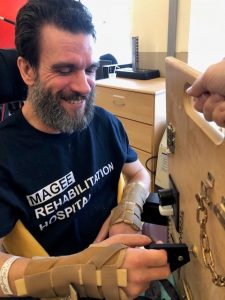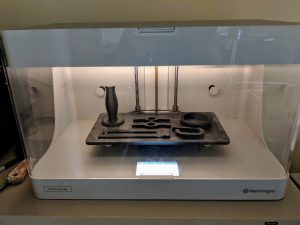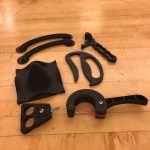
Magee patient using a tool created by the 3D printer which turns a key in a lock.
A number of programs and services at Magee that make a difference for patients and their families have two main ingredients; a dedicated staff member with a vision, and a donor who wants their philanthropic support to make a difference. Magee’s 3D printer is making its mark thanks to that magical combination.
Sometimes donors have ideas of programs that they want to support, or they are just looking for a way to help. A call from Steven Fisher of the Fisher Family Foundation in the spring of 2017 presented a unique opportunity, as he asked to receive two proposals to demonstrate how technology, or assistive technology, could help our patients.
With this in mind, occupational therapist Gina Cooke advocated to bring 3D printing to Magee. This emerging technology allows a clinical team to “print” tools and items that would provide life-changing assistance to those living with disabilities. The process of 3D printing involves making three dimensional solid objects from a digital file by printing successive layers of material. Each of these layers can be seen as a thinly sliced horizontal cross-section of the eventual object.

Magee’s 3D printer
The Fisher Foundation loved the concept and potential of 3D printing at Magee and made a two year financial commitment to start the initiative. Prior to working with the 3D printer, adaptive tools and custom rehabilitation devices were purchased aftermarket or Magee staff would fabricate items using makeshift materials. Since it was launched at Magee in December 2017, the equipment has printed simple adaptive devices for rehabilitation patients, such as key holders and stands for phones and tablets. It can also create more complex items such as customized equipment parts, adapted one-handed nail clippers, heel wedges, soft tissue massagers, brake extenders, and book holders. The machine is enclosed in glass and about the size of a breadbox. Printing can take between one hour and 12 hours, depending on proportions and complexity of the item. Dozens of tools and devices created by the 3D printer have greatly improved the independence of Magee patients.
“It has been very exciting to watch this program grow, and know that when someone has an idea of an item that will help a patient, we can make it using the 3D printer,” said Cooke, Magee Occupational Therapist.

Various tools created by the 3D printer.
The success of the 3D printing has demonstrated the need for a second machine that has the ability to print items in a more flexible material, such as nylon. The Fisher Foundation has continued its support past the initial two years and generously provided the funding for a second printer.
“We are very impressed with how hard the Magee staff works to find creative ways to help patients be independent,” said Steven Fisher of The Fisher Foundation. “We’re thrilled to be able to play some part in that, and look forward to more exciting ways to support Magee and its patients in the future.”




